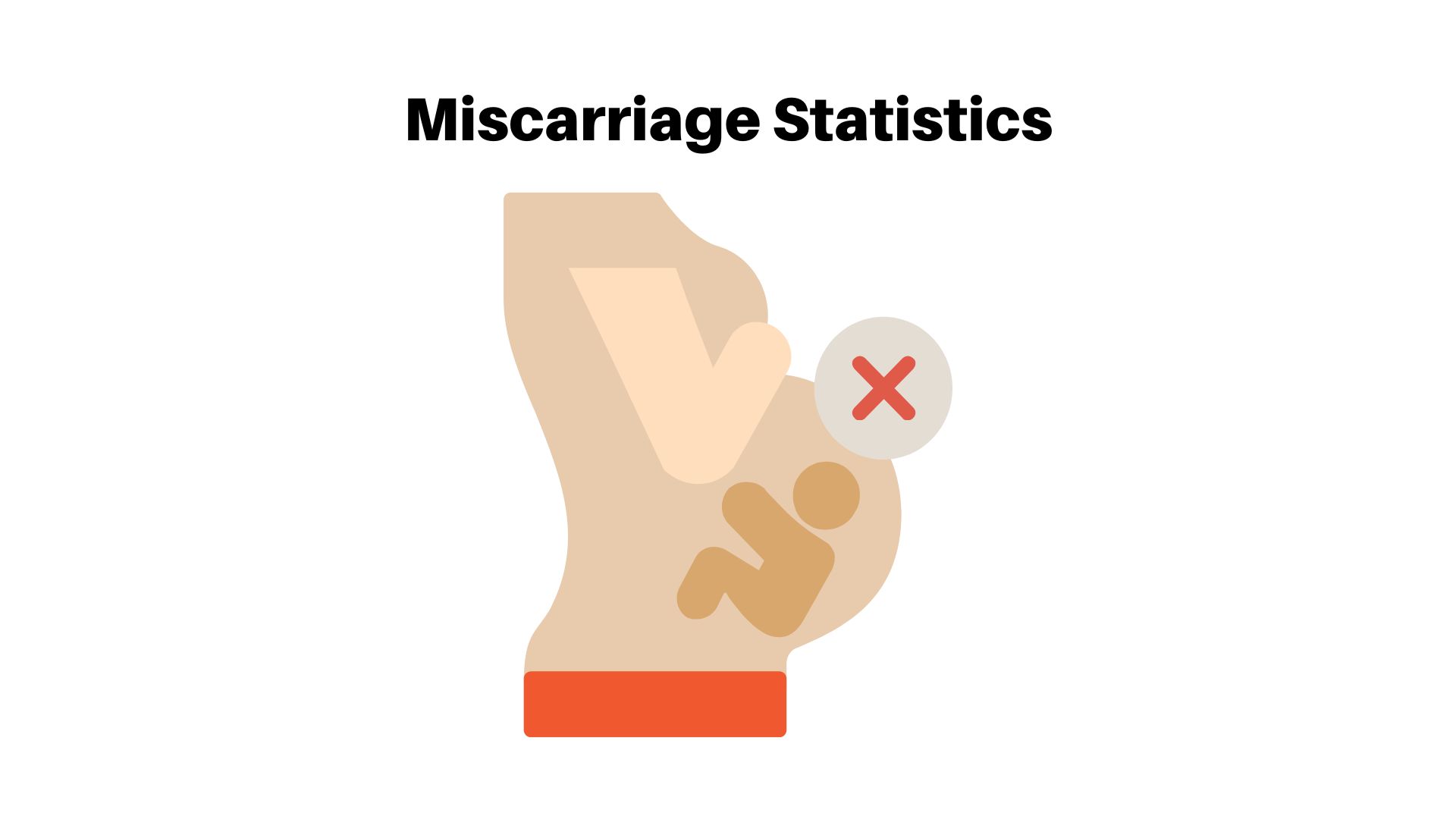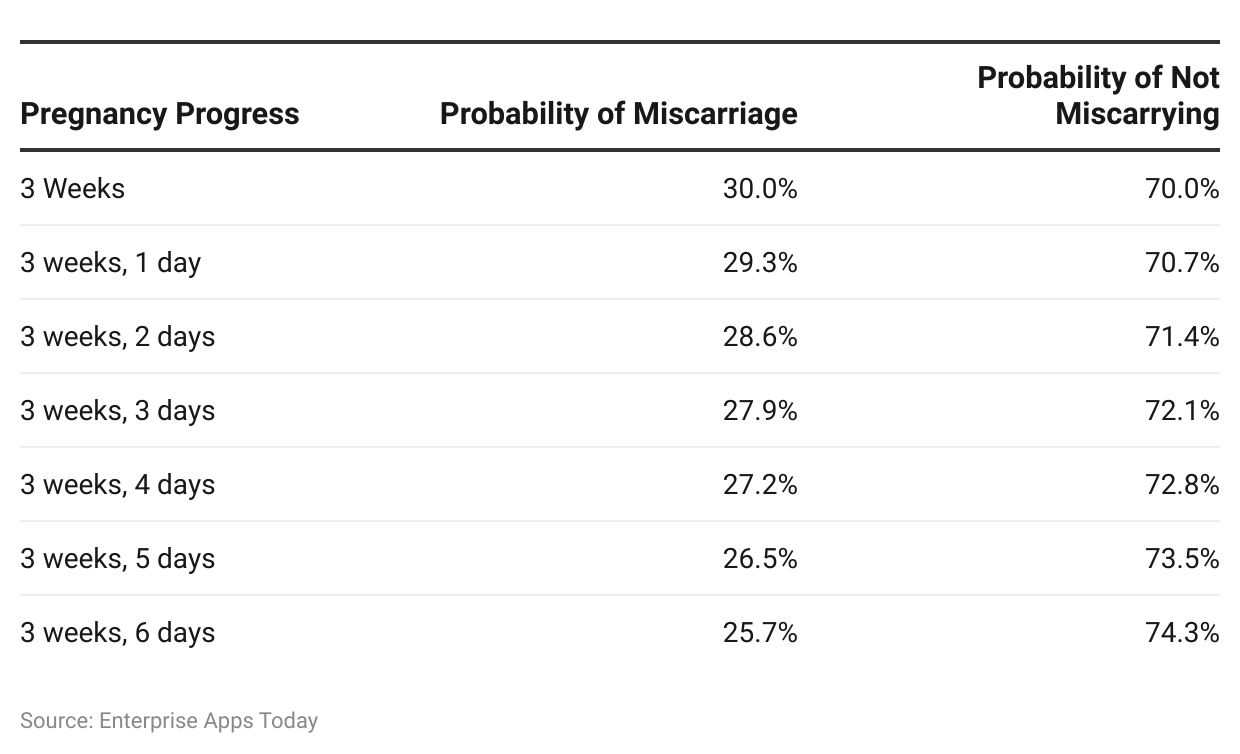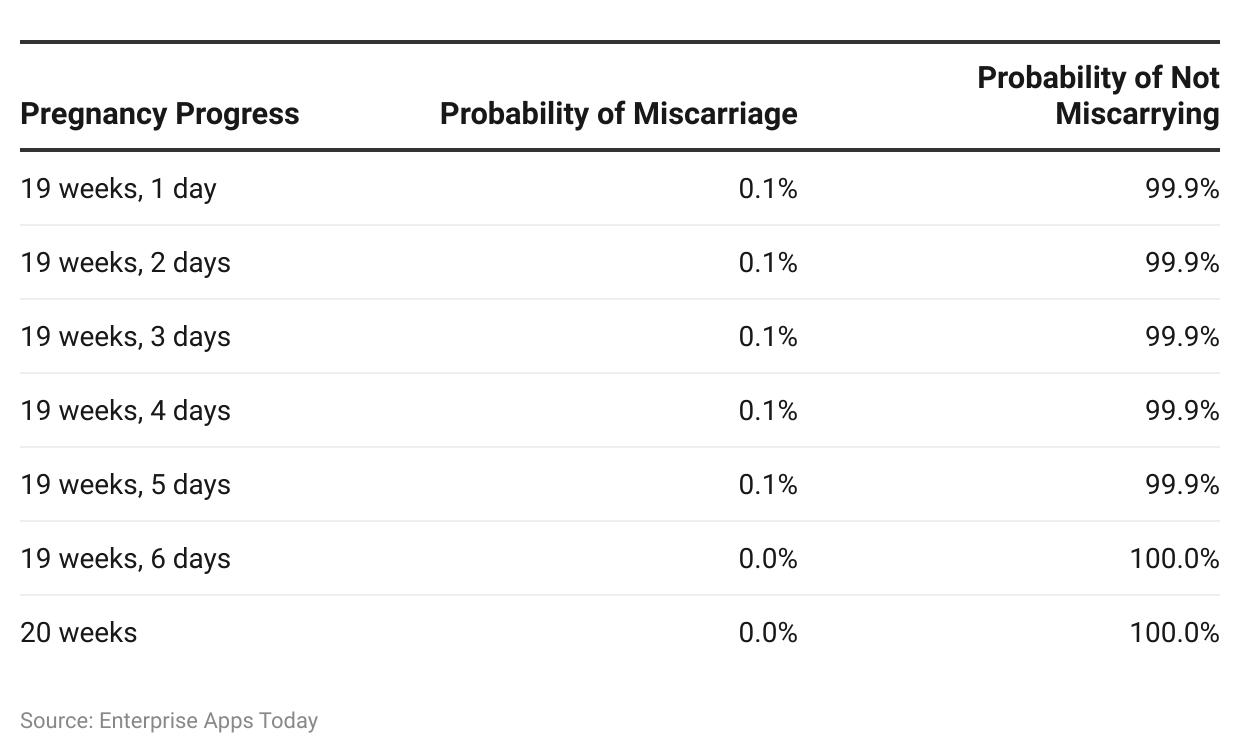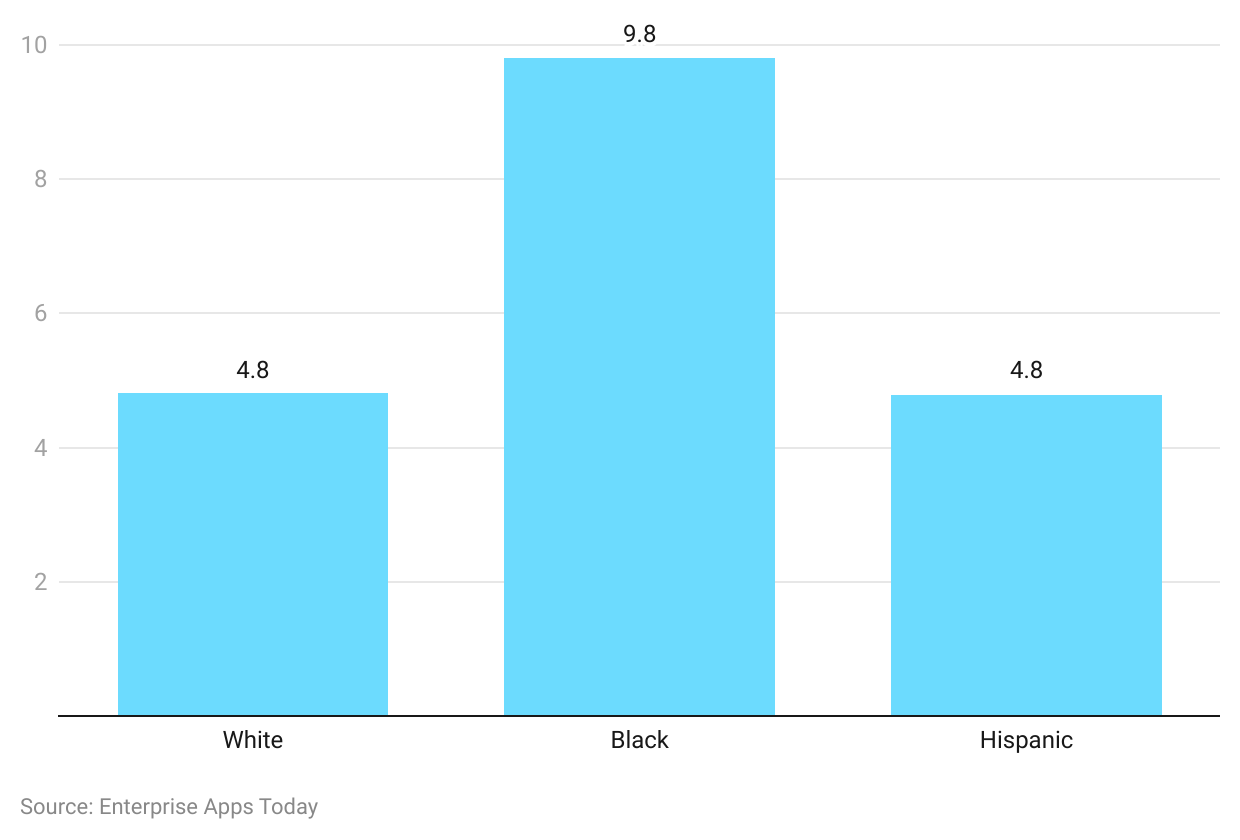Miscarriage Statistics – By Demographic and Number of Pregnancies

Page Contents
- Introduction
- Editor’s Choice
- What Is Miscarriage?
- Types Of Miscarriage
- Causes Of Miscarriage
- Symptoms Of Miscarriage
- Prevention To Avoid Miscarriage
- Facts About Miscarriage
- General Miscarriage Statistics
- Chances Of Miscarriage By Weeks
- Chances Of Miscarriage By Demographic
- By Age
- By Ethnic Background
- By Habit
- By Total Number Of Miscarriages
- By Medical History and Condition
- By Number Of Pregnancies
- Tips To Managing Your Pregnancy For A Healthy Baby
- Conclusion
Introduction
Miscarriage Statistics: In today’s world, miscarriage has become a prominent issue. This is due to the bad lifestyle followed by both fathers and mothers. Considering the pandemic days, people have been working from home and have no energy for the quality time of exercise. It is not only exercise that decides a healthy life, but also eating habits, excessive drinking habits of alcohol, drugs, etc. are increasing the risks of miscarriage. Now it is time to adopt a healthy lifestyle to improve the rates of healthy childbirths. After miscarriage effects cause effects on women’s physical as well as mental health.
Therefore, this miscarriage statistics has been written to provide knowledge about unfortunate events couples are facing around the world along with effective tips for the same.
Editor’s Choice
- Sex during pregnancy doesn’t hurt the baby but it can make the woman uncomfortable.
- As of 2021, the fetal mortality rate was 5.68% for every 1000 women. Out of these, 2.93% experienced it in the early stage and 2.77% experienced it in the later stage.
- The risk of early pregnancy loss increases according to age. The older the age is, the higher the risk associated with it.
- Women with 1 or 2 previous miscarriage histories are more likely to experience it again.
- Two out of 50 women have gone through miscarriages twice and less than 1% experience the same thrice.
- During the last pregnancy termination, the rate of miscarriage for the next pregnancy is 6%.
- Weak cervical tissues or some uterine conditions also possess the risk of miscarriage.
- If the father’s sperm quality is low and fails to perform as expected, then it results in miscarriage.
- Miscarriage statistics say that 1 out of 7 pregnancies experiences early loss of pregnancies.
- Around 7 out of 10 cases are caused when the fertilized egg received the wrong number of chromosomes.
What Is Miscarriage?
In medical terms, miscarriage is termed as pregnancy loss or spontaneous abortion. This case is referred to when the fetus’s death is occurred before being able to survive on its own. There are many known and unknown reasons for miscarriage. As of today, there are no exact statistics on the exact numbers of such cases in the country as these types of cases are mostly kept confidential. The mother and the father are both responsible for miscarriage as the lifestyle of the parents decides the faith of the baby. In case you are facing recurring early pregnancy loss problems, you are advised to visit the doctor.
Types Of Miscarriage
- Recurrent miscarriage: Loss in early pregnancy is found affected to 1% of couples only. It can be counted in 3 or more miscarriages.
- Threatened miscarriage: In this case, the part of the cervix is not opened but it is bleeding and giving pelvic cramps.
- Inevitable miscarriage: This type of miscarriage cause the cervix to dilate and possess a risk of leaking amniotic fluid.
- Completed miscarriage: Pregnancy is totally lost, and the uterus is empty. Bleeding is experienced in this case.
- Missed miscarriage: The heartbeat of the fetus is stopped but the woman has no idea about this matter.
Causes Of Miscarriage
- Weight: Being overweight or underweight is associated with a risk of miscarriage.
- Habits: Extreme drinking, smoking, or drug habit performed by women can lead to early pregnancy loss.
- Chronic illness: Long-term illness such as uncontrolled diabetes, hyperthyroidism, hormonal issues or any other such condition can lead to the early loss of the fetus.
- History of miscarriage: Women with multiple previous histories of miscarriages have a high risk of early pregnancy loss.
- Age: Another important cause of miscarriage, is age.
- Cervical issues: Weak cervical tissues or some uterine conditions also possess the risk of miscarriage.
- Stress or excessive body movements: Too much work stress during pregnancy.
- Excessive consumption of birth control pills.
Symptoms Of Miscarriage
- Weakness
- Severe or increasing back pain day by day
- Weight loss
- Contractions
- Unbearable cramps
- Bleeding from light to heavy
- Blood clots like tissue passing from the female genitalia
- White-pink mucus
- No feeling of baby movement
Prevention To Avoid Miscarriage
- During pregnancy, keep your eating habit healthy.
- Do not consume alcohol, or drugs, and don’t go smoking.
- Keep your boy active and do daily Yoga exercises.
- Maintain body weight.
- Avoid too much consumption of caffeine drinks such as coffee.
- Avoid some foods such as raw or uncooked food, liver and liver products, unpasteurized milk and dairy products, and packed foods. Eating such kinds of food can create poison which is harmful to the developing baby.
Facts About Miscarriage
- Miscarriage is related to a history of previous pregnancies.
- Both father and mother play a significant role in miscarriage. If the father’s sperm quality is low and fails to perform as expected, then it results in miscarriage.
- Similarly, if the father is of old age, it may also cause an early loss of pregnancy.
- Sex during pregnancy doesn’t hurt the baby but it can make the woman uncomfortable.
- Hot baths or saunas can cause developmental problems.
- Infections in the female genitalia increase the risk of midterm miscarriage and preterm labor.
- Morning sickness is related to reducing 70% of miscarriage risk.
- Conceiving the baby just before the day of ovulation or before the day reduces early pregnancy loss by 50%.
General Miscarriage Statistics
- Miscarriage statistics say that around 7 out of 10 cases are caused when the fertilized egg received the wrong number of chromosomes.
- Problems with the cervix and uterus can lead to miscarriage.
- Furthermore, miscarriage statistics say that 1 out of 7 pregnancies experiences early loss of pregnancies.
- Two out of 50 women have gone through miscarriages twice and less than 1% experience the same thrice.
- As of 2021, the fetal mortality rate was 5.68% for every 1000 women. Out of these, 2.93% experienced it in the early stage and 2.77% experienced it in the later stage.
- Women with 1 or 2 previous miscarriage histories are more likely to experience it again.
- The risk of early pregnancy loss increases according to age. The older the age is, the higher the risk associated with it.
- The risk of early pregnancy loss increases by 7% and the rate double after upcoming unsuccessful pregnancies.
- Induced abortion may increase the risk by 128%.
- Women aged between 50-74 and experienced miscarriage in their life have an increased heart attack risk by 40%.
Chances Of Miscarriage By Weeks
By Highest
 (Reference: datayze.com)
(Reference: datayze.com)
- The pregnancy cases from week 3 have the highest rate of miscarriage with 30% and 70% of success rates.
- From weeks 3 and added days, Miscarriage Statistics state the following insight: 3 weeks 1-day Miscarriage 29.3% miscarriage rate 70.7% success rate, 3 weeks 2 days Miscarriage 28.6% miscarriage rate 71.4% success rate, 3 weeks 3 days Miscarriage 27.9% miscarriage rate 72.1% success rate, 3 weeks 4 days Miscarriage 27.2% miscarriage rate 72.8% success rate, 3 weeks 5 days Miscarriage 26.5% miscarriage rate 73.5% success rate and 3 weeks 6 days Miscarriage 25.7% miscarriage rate 74.3% success rate.
By Lowest
 (Reference: datayze.com)
(Reference: datayze.com)
- The above chart provides information on the lowest weeks associated with pregnancy weeks as stated by miscarriage statistics.
- 19 weeks, 1 day (0.1% miscarriage rate 9% success rate), 19 weeks, 2 days (0.1% miscarriage rate 99.9% success rate), 19 weeks, 3 days (0.1% miscarriage rate 99.9% success rate), 19 weeks, 4 days (0.1% miscarriage rate 99.9% success rate), 19 weeks, 5 days (0.1% miscarriage rate 99.9% success rate).
- And 19 weeks, 6 days (0% miscarriage rate 100% success rate), 20 weeks (0% miscarriage rate 100% success rate).
Chances Of Miscarriage By Demographic
By Age
| Maternal age(years) | Miscarriage risk(%) |
|---|---|
| 12-29 | 13 |
| 20-24 | 11 |
| 25-29 | 12 |
| 30-34 | 15 |
| 35-39 | 25 |
| 40-44 | 51 |
| >=45 | 93 |
(Reference: Wiley Online Library)
- Girls who become pregnant at the age of 12 years to 19 years have a miscarriage risk of 13% irrespective of the history and number of pregnancies.
- Similarly, women aged between 20 years to 24 years have a risk of 11%, and women between 25 years to 29 years are a risk of 12%.
- 15% and 25% of the miscarriage risks are associated with women aged between 30 years to 34 years and 35 years to 39 years respectively.
- And if a woman gets pregnant between the age of 40 years to 44 years, they have a risk of miscarriage at 51%.
- The highest risk of early pregnancy loss is for women aged 45 years and above at 93%.
By Ethnic Background
 (Reference: USNEWS.com)
(Reference: USNEWS.com)
- Considering the miscarriage statistics of ethnic background insights, the study shows that, in the year 2021 4.81% of women who experienced miscarriage were non-Hispanic white women by race.
- 80% of women were from the non-Hispanic black population group.
- Similarly, 4.79% of women with early pregnancy loss cases were from the Hispanic ethnic background population.
By Habit
| Current Smoker | 17.0 |
| No Smoker | 80.4 |
| Previous Smoker | 2.6 |
(Reference: OXFORD ACADEMY)
- 17% of the women who faced early pregnancy loss were smoking actively as stated by Miscarriage statistics.
- 4% of the women were never a smoker and therefore recorded as a non-smoker.
- 6% of women said they were smoking previously before becoming pregnant or even in the earlier period.
By Total Number Of Miscarriages
| 3 | 64.6 |
| 4 | 22.2 |
| 5 | 7.6 |
| 6 | 3.3 |
| 7 | 1.5 |
| 8 | 0.1 |
| 9 | 0.3 |
| 10 | 0.3 |
| 12 | 0.1 |
(Reference: OXFORD ACADEMY)
- As per Miscarriage statistics, in the year 2022, there were 64.6% of women who previously had 3 miscarriages.
- 2% of women experienced 4 and 7.6% of women had 5 early pregnancy losses respectively.
- 6 miscarriages were experienced by 3.3% of women while there were 1.5% of women with 7 early pregnancy losses.
- There were around 0.1% and 0.3% each for 8, 9, and 10 miscarriage cases in the year 2022.
- 1% of women experienced around 12 early pregnancy loss cases.
By Medical History and Condition
| Documented Medical History | |
|---|---|
| No medical History | 73.5 |
| Medical History | 26.5 |
| Recorded Medical Conditions | |
| Hypothyroidism | 6.4 |
| Autoimmune disorder | 3.2 |
| Mental Health Disorder | 2.9 |
(Reference: OXFORD ACADEMY)
- According to Miscarriage statistics of 2022, 73.5% of women who had an abortion recorded no medical history.
- On the other hand, 26.5% of women showed medical history.
- Women with medical history had a medical history of hypothyroidism resulting in 6.4%.
- Similarly, 3.2% and 2.9% were struggling with autoimmune disorders and mental health disorders.
By Number Of Pregnancies
| First Pregnancy | 5% |
| Last Pregnancy terminated | 6% |
| Last Pregnancy a live birth | 5% |
| All Pregnancies are live births | 4% |
| 1 previous miscarriage | 20% |
| 2 previous miscarriage | 28% |
| 3 previous miscarriage | 43% |
(Reference: huggies.com)
- There is only a 5% risk of loss of the fetus during the first pregnancy as stated by Miscarriage statistics.
- During the last pregnancy termination, the rate of miscarriage for the next pregnancy is 6%.
- After the last pregnancy, live birth, and all pregnancies live birth the rate of miscarriage is 6% and 5% accordingly.
- If a woman experienced a previous miscarriage, then after 1 early pregnancy loss, then the second one is associated with a 20% risk, while 2 previous miscarriages have a 28% risk and 3 miscarriages are associated with 43%.
Tips To Managing Your Pregnancy For A Healthy Baby
- Wear comfortable clothes.
- Eat food filled with fiber as well as change your eating habit to healthy ones.
- Fix the sleeping cycle.
- Avoid situations that create stress and unhappy emotions.
- Limit caffeine use.
- Don’t drink alcoholic drinks and avoid smoking.
- Perform physical activities as required but do not overload the body.
- Keep doing weekly or monthly checkups with the doctor as required.
- If you have a long-term illness such as diabetes or thyroid, keep your sugar level as well as your thyroid under control.
- Relax your mind.
- Read books and watch comedy movies.
- And for the husbands, take care of your wife.
Conclusion
Unfortunately, there are many couples today who are going through this hard phase. In many cases due to natural reasons, miscarriage can’t be prevented, but the things which are in our hands must be taken care of. Lifestyles adopted by parents affect badly on the baby, thus before, during, and after pregnancy, it is advisable to eat healthy food, regular exercise, and prevent the consumption of alcoholic drugs is advised. Moreover, to give a birth to healthy child couple must conceive at the appropriate young age.
Sources
FAQ.
You should immediately visit a doctor for further medical actions. It is better to keep your mind calm and focused.
Not really, but if you have any problems related to hype tensions caused by stress then it may lead to miscarriage.
Miscarriage is detected by the doctor’s assistance only. Doctors may perform tests such as physical examination, lab testing, or ultrasound to confirm the case.
Yoga or exercise without too much stress on the body is beneficial for the baby and the mother. Therefore, it is important to exercise during pregnancy to avoid problems such as miscarriage.

By conducting scientific research, I write about illness, health and healthcare. As a professional medical writer, my experience includes creating feature articles for newsletters and websites as well as research news stories for doctors and researchers. Reading has been an integral part of me since childhood - I'm fan of "Friends" and the "Harry Potter series". Before this career, I was employed by a French multinational company. However, my passion for reading led me to pursue writing professionally; my first Amazon-published short story entitled "The envelope that changed our lives" has recently been released. In my free moments, I enjoy long bike rides around town.